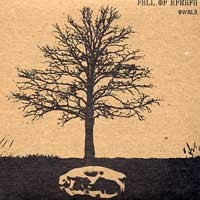There has been a lot of talk about Fall of Efrafa, and their concept. After all, when you base your entire band around a "re-imagining of the mythological and political overtones in the book Watership Down by Richard Adams," even the most open-minded punk might be a bit scared of how pretentious the end product could be. Add a very strong atheist slant, and a strong focus on animal rights, and the fact that the band planned to break up after their third record (...from their inception), and you have a recipe for a band who better have a very strong musical statement to back up exactly how much you have to think about before you even listen. Luckily, Fall of Efrafa backs these concepts up and then some.
Placing Fall of Efrafa into a neat genre is impossible. Even on OWSLA (meaning âprotectors' in Lapine, the language of the rabbits from Richard Adams' novel, also the band's first, least developed release), we have moments of post-rock nuance, furious crust in the vein of His Hero Is Gone, and a truly wrenching brand of mid-tempo hardcore, sometimes delving into sludgier territory. To recommend a band for fans of Godspeed You! Black Emperor as well as World Burns to Death is a bit strange, but for Fall of Efrafa, it makes perfect sense.
The album begins with a short instrumental intro, consisting of very creepy dialogue from the animated version of the novel the band is based upon. It is extremely unsettling. When the track segues into Track 2, "Pity the Weak," you are lulled into a bit more calming territory. A soothing yet ominous cello finds its way into the mix and you can feel something sinister brewing. By the 40-second mark the band has flipped a switch on you, morphing into fast, gruff, yet extremely melodic crust with a strong punk rock backbone. From here the band slows down a bit, giving the riffs a bit more room to breathe, before dropping out almost completely, except for a lone bassline, and more sampled audio from the animated movie. From here, the band builds a simple chant into a fury, before moving into some of the aforementioned mid-tempo, melodic hardcore. The last minute of the song is a reprise of the fast crust from earlier, and it is very effective. A plus with this song is the amazing lyrics, written from the point of view of the humans who are destroying the rabbits' homes. They may come off as preachy to the more apathetic of the orgcore crowd, but given the scope of the music, it fits well.
Track 3, "A Soul to Bear" seeks a more up-tempo sound from the beginning, the intro almost sounding like a Celtic folk-punk song filtered through a crust punk lens. While not my personal favorite, it is a strong track nonetheless. This is probably the band's most straightforward song. There are some nice sludgy riffs towards the end of the song, and a constant presence of the cello that keeps things interesting. A fairly short track, at least for the band, this may be a good place to start for some people. I'd just recommend listening to the album as a whole though, as it really is one of those albums you will apprecciate more if you listen all the way through.
After short interlude "Lament," this time being somber piano, "Last But Not Least" comes through your speakers, finding the band at its most reserved, moving seamlessly between a heavy post-rock influence and a more mid- to down-tempo version of their epic-for-lack-of-a-better-word crust punk assault. At 10 minutes long, this track can be a lot for a casual listener to get through, but if you give it time to simmer, you won't be sorry.
Album closer, and the final part of the narrative of Fall of Efrafa, their self-titled song, may be the highlight of the album, and I can't bear to give too much of it away. I will say that when you get to the sampled audio of "The fields, the fields are covered with blood," followed by vocalist Alex's howl of "The Warren is empty" over and over, it's hard not to be affected. It's really hard to believe that a band could have such a relatively unique voice and be so developed so quickly.
The band would progress immensely through their career, becoming even more nuanced on second album Elil (meaning 'enemies,' focusing on the evils of man and religion) before blending the two sounds on closer to the trilogy, Inle (meaning 'darkness,' or death; it's appropriately titled as it is the darkest of the three records). OWSLA, though, stands as a very strong statement from a band that already had a lot to say in the first place. Though some may like the later records better, OWSLA is a perfect place to start, and about as accessible as Fall of Efrafa gets.
